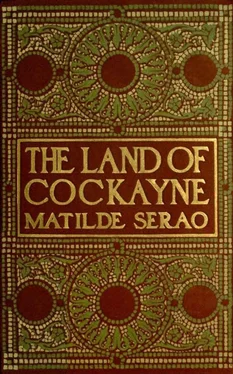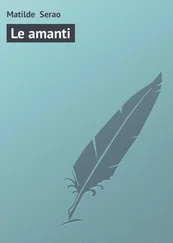Matilde Serao - The Land of Cockayne
Здесь есть возможность читать онлайн «Matilde Serao - The Land of Cockayne» — ознакомительный отрывок электронной книги совершенно бесплатно, а после прочтения отрывка купить полную версию. В некоторых случаях можно слушать аудио, скачать через торрент в формате fb2 и присутствует краткое содержание. Жанр: unrecognised, на английском языке. Описание произведения, (предисловие) а так же отзывы посетителей доступны на портале библиотеки ЛибКат.
- Название:The Land of Cockayne
- Автор:
- Жанр:
- Год:неизвестен
- ISBN:нет данных
- Рейтинг книги:3 / 5. Голосов: 1
-
Избранное:Добавить в избранное
- Отзывы:
-
Ваша оценка:
- 60
- 1
- 2
- 3
- 4
- 5
The Land of Cockayne: краткое содержание, описание и аннотация
Предлагаем к чтению аннотацию, описание, краткое содержание или предисловие (зависит от того, что написал сам автор книги «The Land of Cockayne»). Если вы не нашли необходимую информацию о книге — напишите в комментариях, мы постараемся отыскать её.
The Land of Cockayne — читать онлайн ознакомительный отрывок
Ниже представлен текст книги, разбитый по страницам. Система сохранения места последней прочитанной страницы, позволяет с удобством читать онлайн бесплатно книгу «The Land of Cockayne», без необходимости каждый раз заново искать на чём Вы остановились. Поставьте закладку, и сможете в любой момент перейти на страницу, на которой закончили чтение.
Интервал:
Закладка:
She felt so miserable as she went down San Giovanni Maggiore steps at Mezzocannone, getting nearer as she was to her saddest charge, that she could have killed herself for being so helpless and useless. Still, she went on into an out-of-the-way court in the Mercanti, that looked like a servants' yard, then stopped and leant against the wall as if she could go no further. It was a dirty place, with greasy water, fruit-skins, and a woman's broken old hat thrown into a corner. Three windows of the first-floor had half-open green jalousies, just letting in a ray of light—mean little windows and faded jalousies, on which dust, rain, and the sun had left their mark; then a little doorway, with a damp step broken to bits, and a narrow black passage like a gutter. Carmela looked inside, her eyes wide open from curiosity and fear. Rather an old woman, a servant, came out, holding up her skirt not to dirty it in the gutter. Carmela knew her, evidently, for she turned to her frankly:
'Donna Rosa, will you call Filomena?'
The woman looked to see who it was; then, without going into the house again, she called from the courtyard towards the first-floor windows:
'Filomena! Filomena!'
'Who is it?' a hoarse voice answered from inside.
'Your sister wants you—come down.'
'I am coming,' said the voice more gently.
'Thanks, Donna Rosa,' said Carmela.
'Glad to serve you,' said the other briefly as she went off.
Filomena kept her waiting two or three minutes; then a regular beat of wooden heels came along the passage, and she appeared. She wore a white muslin skirt, with a high flounce of white embroidery, a cream woollen bodice, much trimmed with knots of velvet ribbon at the wrists and waist. She had a pink chenille shawl round her neck; patent-leather shoes with high heels, and red silk stockings showed under the skirt. In face she was like both her sisters, but her well-dressed hair, with light shell pins, and the rouge on her colourless cheeks, made one forget the likeness to Annarella, and made her much more attractive than Carmela. The two sisters did not kiss nor shake hands, but they gave each other so intense a look that it sufficed for everything.
'How are you?' asked Carmela in a trembling voice.
'I am well,' said Filomena, shaking her head, as if her health did not matter. 'How is mother?'
'Just as an old woman always is.... Poor mother!'
'How is Annarella?'
'She is full of trouble....'
'Wretched, eh?'
'Yes, she is wretched.'
They both sighed deeply as they looked at each other; a blush and a pallor altered their faces.
'I bring you bad news to-day, too, Filomena,' Carmela said at last.
'Have you won nothing?' Filomena asked.
'No, nothing!'
'My luck is bad,' Filomena said. 'I have made many vows to the Virgin—not, indeed, to the Immaculate one; I am not even worthy to name her—but to our Lady of Sorrows, who understands and pities my disgrace; but nothing has come.'
'Our Lady of Sorrows will grant us this grace,' Carmela said softly. 'Let us hope that next Saturday——'
'We will hope so,' the other answered humbly.
'Good-bye, Filomena!'
'Good-bye, Carmela!'
Filomena turned her back and disappeared into the passage, her wooden heels making her steps rhythmical; then Carmela was going to rush after her to call her, but she was already in the house. The girl went off, wrapping herself convulsively in her shawl, biting her lips not to sob. All the other bitternesses—all, even going without bread—were nothing in comparison to what she left behind: that came by itself, a constant poison, an eternal shame, to her heart.
At half-past five the Impresa court was quite empty and silent; no one came in, not even to look at that solitary board with the five numbers: they had already been put up at all the lottery-shops in Naples; there was a group of people before each, all through the town. No one went into the Impresa court; the crowd would only come back in seven days. Then there was a noise of footsteps. It was the lottery usher, leading the two poor-house children by the hand—the one who had drawn the numbers, and he who was to draw them next Saturday. The usher was taking them back to the asylum, where he would leave the twenty francs, the weekly payment the Royal Lottery gives to the child that draws the numbers. The two boys trod on each other's heels behind the usher, chattering gaily. The white sewer, working at her machine, raised her head and smiled at them. Then she began to beat her foot on the pedal and pull the bit of linen straight under the needle; she went on quietly, indefatigably, a pure humble image of labour.
CHAPTER II – AGNESINA FRAGALÀ'S CHRISTENING
'Agnesina Fragalà, papa's lovely daughter,' said the young father, leaning over the brass cradle that shone like gold, holding open the lace curtains with rose-coloured ribbons, and petting with words, glances, and smiles the pink new-born babe that was placidly sleeping. 'Agnesina, Agnesina,' he went on saying playfully, 'I think you are very pretty.'
'Be quiet, Cesare; you will wake the baby,' the mother said in a whisper, from the toilet-glass she was sitting at.
'She will have to be wakened later on, at any rate; ought we not to show her to our guests?'
'Yes; I just hope she won't begin screaming in the drawing-room!' the young mother replied, smiling, half from nervous fears, half from motherly pride.
'Bah!' said the young father, leaving the cradle and coming near to his wife. 'The guests will be taken up eating cakes, sweets, and ices. You will see a gourmandizing, Luisella!'
The light edifice of Luisa Fragalà's intensely black hair was skilfully and prettily arranged; some curls shaded her short brown forehead, with its black eyebrows in the youthful oval face; and the long Eastern eyes of sparkling gray, soft and piquant, the rather long, broad, though well-shaped nose, and baby mouth, pink as a carnation, had a charm of youth and freshness that made her still enamoured husband smile with pleasure.
Cesare Fragalà was young and handsome, too—rather effeminately handsome, perhaps; his skin was as white as a woman's; his chestnut hair curled all over up to the temples, showing in places the white skin underneath; his face was round, rather boyish still, in spite of his being twenty-eight; but his close-shaven cheeks had a warm Southern pallor that was quite manly, and a thick curly moustache corrected that effeminate, boyish look. Both of them of burgher rank, of no degenerate race, they had the characteristics of Neapolitan youth. The man was strong, but indolent; good-looking and rather inclined to care for his appearance; his softness was visibly mixed with roguishness, from the contrasts in his face, where a coarse look was tempered by good-nature. The woman, dark and elegant, with that blood that seems to have dull flashes, that resoluteness of will in the profile and chin that shows a secret latent force in a woman's heart, ready for passion and sacrifice.
The surroundings were like themselves, from the rather vulgar luxury of pink and cream brocade that covered the furniture and the bed, the French paper on the walls of much the same design, the toilet-glass draped in white lace—precious work done by the bride's own hands before the wedding—to the great wardrobe of dark wood, with gold lines and three looking-glass doors, the height of luxury at that time; from the numerous images of saints—Saint Louis in silver, the face in wax; a Saint Cesare of stucco in a monk's habit, with rosaries, reliquaries, and Easter candles, forming a trophy, on each side of the bed—up to the silver lamp, lighted, before the Infant Jesus, in a niche; and in the same conjugal apartment, from plebeian tenderness, and that strong patriarchal feeling of Neapolitans, was the cradle, gay with ribbons, where the little one of a month old was sleeping. Everything was striking, even their clothes. Cesare Fragalà, expecting his guests shortly, had on his coat already, a handkerchief stuck in his shirt, and his curly hair smooth by dint of hard brushing; but his watch-chain was too bright, his studs too large, and his necktie was white silk instead of white batiste. Luisa looked very pretty in her yellow silk, with a white muslin wrapper over it while her hair was done, but she sparkled too much from diamonds in her ears, on her neck, and on her arms. Just then the hair-dresser put a brilliant star in front as a finish.
Читать дальшеИнтервал:
Закладка:
Похожие книги на «The Land of Cockayne»
Представляем Вашему вниманию похожие книги на «The Land of Cockayne» списком для выбора. Мы отобрали схожую по названию и смыслу литературу в надежде предоставить читателям больше вариантов отыскать новые, интересные, ещё непрочитанные произведения.
Обсуждение, отзывы о книге «The Land of Cockayne» и просто собственные мнения читателей. Оставьте ваши комментарии, напишите, что Вы думаете о произведении, его смысле или главных героях. Укажите что конкретно понравилось, а что нет, и почему Вы так считаете.












